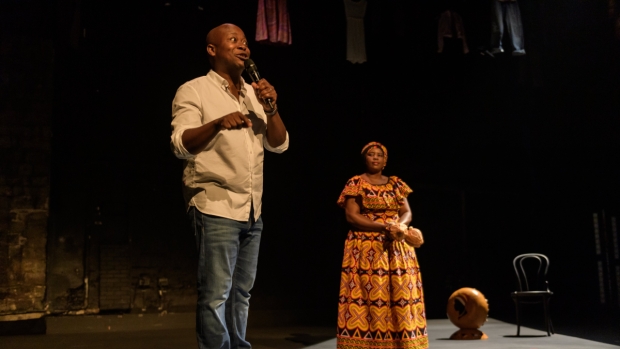Mugabe, My Dad & Me at York Theatre Royal – review

The pandemic, lockdowns, social distancing and the rest have spread everything from irritation to despair through the theatre world in general, but for Tonderai Munyevu the effects have been very specific. His play, Mugabe, My Dad and Me, scheduled for a 2020 run in the Theatre Royal Studio, has undergone multiple postponements and has finally surfaced in the main theatre, the more suitable intimate space being temporarily out of action. It's fair to say the quality of the text and performance triumphs despite the uncongenial setting.
Tonde, as he is always referred to in the play, is a gay Zimbabwean actor/writer who has been in this country for many years. He knows no other ruler of Zimbabwe than Robert Mugabe. Tonde's mother flees his father's violence for the UK and, when his father dies, Tonde doesn't bother to go back for the funeral. It's only when Mugabe is toppled, a rift in the world picture he knows, that Tonde returns – and tries to understand and evaluate the world of his father and Mugabe and the place of what he calls the Diasporians, such as himself. The result is a fairly simple narrative and a highly complex examination of family, tradition, nationality, land, power – and, above all, identity.
Munyevu bounds cheerfully on stage, all welcoming grin and merrily wide-open eyes, and goes into a routine, ending with a deliberately awful joke, that comes dangerously close to tilting the audience response the wrong way. The laughs remain even when the play itself starts and the subject matter gets serious, but before long the audience is deeply involved in Tonde's world.
The first scene is a powerful riff on the "Where are you from?" theme. Tonde is pulling pints in a London pub (out of work actor), when a middle-aged customer who, like a fair few pub-bore Brits, knows more about Africa than the Africans, delivers a series of insulting questions. In a neat coup, Tonde then turns, not aggressively, on the white audience and promising us a history lesson. How did he know the audience would be predominantly white? (It was.)
Wryly personal and powerfully political scenes alternate rapidly – a scene with Tonde on the booze looking for a sexual pick-up in Soho and barely reacting to the news of his father's death is wonderfully queasy – until the pace picks up as Tonde returns to Zimbabwe. A series of thought-provoking scenes culminate in Tonde at his father's graveside inadvertently summoning up the late President. His initial comical bonhomie ("Call me Bob") dissipates as Tonde questions him about whether the Zimbabwe he built justifies the lives sacrificed to create it. Mugabe keeps swinging the blame onto the West, notably Tony Blair, and, if we are left in no doubt that Mugabe became an evil tyrant, we question whether the nature of his evil was the same as we in the West assume it to be.
Munyevu is by turn engaging and passionate and plays out the set piece dialogues (with his father, a policeman or Mugabe) with great animation and subtlety. However, this review has been written as though it were a one-man show and there were two people on stage almost throughout: Millie Chapanda, in traditional costume in contrast to Munyevu's casual white shirt and jeans, mostly plays the mbira, its bell-like sound a rippling accompaniment to Tonde's narrative. It's more complex than this: she tells the story of the mbira's significance in Zimbabwean celebration, she represents the female in African culture (Munyevu insists that all performances of his play have a female mbira player) and, when his story ends inconclusively, Mama Africa plays and sings of the links between the living and the dead.










